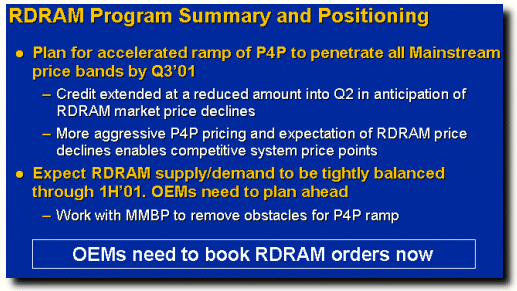Quo Vadis Intel? The Latest Roadmap
Introduction
Currently Intel is offering three different processor types and a variety of chipsets for the mainstream market. Interestingly enough, none of the three processor-types is perfect, particularly if you look at them in terms of price/performance. The low-end or 'value' processor 'Celeron' is unable to deliver the same price/performance as AMD's Duron processor, the same is valid for Intel's mid-range processor Pentium III, which has big difficulties to compete against AMD's Athlon in terms of performance as well as price. Pentium 4, Intel's new flagship processor, is hindered by its rather inconsistent and in large parts unimpressive performance in today's applications as well as its high price. To make matters worse for this CPU, it can only operate with the expensive and still rather unpopular RDRAM memory, which even needs to be purchased in two pieces rather than only one.
Still there's of course no reason to feel sorry for Intel, since this company is still able to sell even inferior products at high prices due to its marketing machine, long history and a large following of OEMs, who always smell big bucks as long as they sail in Intel's wake.
Intel Influencing The Future
Intel's roadmaps, which are of course supposed to be kept secretly from the press and the public, are often more than just listings of Intel's future products. In every roadmap that I have seen so far (and that's some 50 or more) Intel is in fact foretelling the future. In principle, there's certainly nothing wrong with that. We all happen to claim we know what will happen in a few days, months or years from now once in a while. However, there is a difference in general perception, depending on who makes those projections and who actually listens to them. Intel has a long and respected history of being able to 'bend' the future of the PC-market. Therefore, if Intel tells the OEMs that something is supposed to happen, the OEMs believe it and act accordingly, so that in the end it is indeed taking place. Wouldn't you sometimes wish you had the same influence on the future as well? I bet AMD does.
Basically, Intel's roadmaps are supposed to tell the customers what they are expected to do, to make (Intel as well as themselves) as much money as possible, and except for the mistakes made with the 820 chipset, the bad image of Rambus and its expensive but below-par performing RDRAM memory, the following MTH-debacle and the retraction of Pentium III 1.13 GHz, Intel has served its customers well with it. Today, Intel wishes to forget those former failings and tries to pick up the threat of the times before Camino and Pentium III 1.13 GHz. The roadmaps are as full of enthusiasm as ever.
Get Tom's Hardware's best news and in-depth reviews, straight to your inbox.
